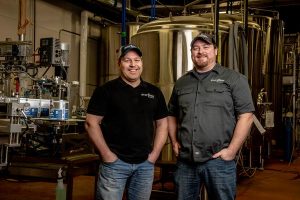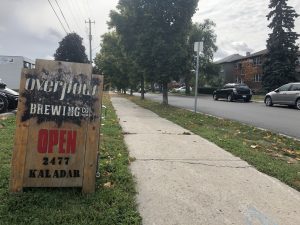
Green bin service requests have increased by almost 40 per cent so far this year in Gloucester-South Nepean, analysis of Ottawa’s 3-1-1 data shows. Experts and city says the trend is an indication of a rise in public composting due to plastic bags and the COVID-19 pandemic.
These requests for service can range from replacing green bins, calls for cleanup, to an increased number of households needing bins, according to Shelley McDonald, acting Director of Solid Waste Service for the City of Ottawa.
In June 2019 the City of Ottawa permitted the use of plastic bags to dispose of their organics to increase the public’s composting. This came shortly after a market research survey carried out by Hill and Knowlton Strategies, found that 60 per cent of people said they would compost if they could use plastic bags.
An infographic showing the key information about the 3-1-1 service requests from 2019-2020 in Gloucester-South Nepean ward. Created by Max Bakony.
The increase in the ward’s green bin service requests comes from growing community diversity, according to 30-year-old David Brown, executive assistant for the ward’s city councilor Carole Anne Meehan, who was unavailable for interview.
“We’re seeing a lot of younger people moving in, particularly with families,” says Brown, a long-time resident of the area. “Our generation has that established mindset of ‘we must do more to help reduce climate change.’”
Organics waste experts agree that there have been strong indicators that more are composting in Ottawa.
Michael Leopold, the CEO of Convertus Group which composts the city’s organics waste, says they found a 20 per cent increase in their volume of organic waste this winter.
Tim Middleton, operations manager for Convertus’ Ottawa facility says that their peak volumes are normally in the spring and fall. “But we were at peak levels (of organics and leaf and yard waste) from spring till the end of September.”
A table showing the key information about the 3-1-1 service requests from 2016-2020 in Gloucester-South Nepean ward. Created by Max Bakony.
The pandemic could also be more of a reason, according to Shawn Menard, the vice-chair of the Environmental Protection, Water and Waste Management Committee:
“It’s hard to separate how (the use of plastic bags in green bins) has had an effect versus people being at home for the pandemic,” says Menard. Middleton, Leopold, and Brown all agree.
Even though more appear to be using the green bin, Menard, is unsure whether using plastic bags is an appropriate solution to increasing public composting.
Citing that the recent transition to composting with plastic could be affecting the compost produced by the facility, the vice-chair would like to see some more samples of what happens to the organic waste.
“At the end of the day the federal government is talking about banning single-use plastic bags and that’s probably a good thing,” Menard says of Prime Minister Justin Trudeau’s intentions to ban all single-use plastics in Canada by 2021.
Leopold agrees that using plastic may not be the most appropriate method to increase green bin use but insists there’s little harm in plastic bags affecting the non-agricultural sourced material produced from the waste.
“If you get any type of contaminant in your compost it’s more of a hard plastic like a pen cap… that’s more likely to get through,” says Leopold. “Film plastic, which is what plastic bags are made of, gets screened out and we never see that in the compost (produced).”
Ariela Summit, an expert on community environmental planning and an assistant to Menard, argues that it never made sense to accept plastic bags into composting when there were so many better methods like limiting the number of trash bags you can put out, or mandating clear trash bags and not allowing organics in them.
“This is not something the city has been willing to do so far,” says Summit.
Though plastic bags inclusion into green bins may be short-lived, Brown believes that they may have done some lasting good.
He admits that a ban on the plastic bags would have a small impact on public composting but “if people are used to using green bins right now, I think you’ll see a lot of people continue to use them.”


